#khwaja sira community
Explore tagged Tumblr posts
Text

The term ‘Khwaja Sira’, ‘khwaja’ meaning ‘master’ in Persian and ‘sira’ associated with a person in service, is an umbrella term for people who identify as trans, intersex, or eunuch. During the Mughal rule in the subcontinent, the Khwaja Sira community had many important roles to play as they acted as advisors to the emperors, contributing largely to poetry and the arts. They were seen as spiritual guides with heavy political influence, establishing trade, mediating between squabbles in the courts, and blessing ceremonies.
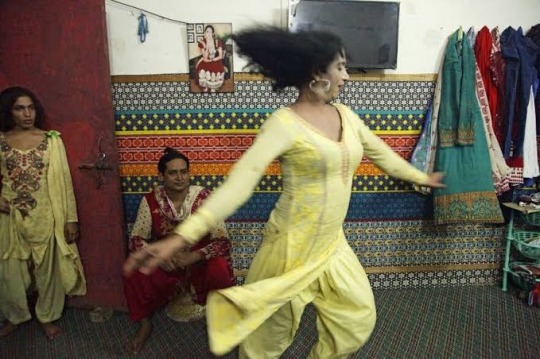
#khwaja sira community#khwaja sira#trans#intersex#queer asian#Pakistan#Pakistani#South Asia#queer fashion#queer identity#trans poc#transgender#third gender
37 notes
·
View notes
Text
This article is about the experiences of trans men in Pakistan; one of the men interviewed is also intersex. It discusses their experiences with anti-transmasculine transphobia and intersexism, but I also found this part at the end interesting:
“I am an official chela in the transgender community,” smiles Shahzaib [one of the trans men]. A chela lives under the advice and support of his guru, an older, experienced, transgender woman who is the head of the Khwaja Sira household, he explains. “If you look at history, transmen, or those women who didn’t want to marry or didn’t consider themselves women, had a place in Khwaja Sira households. So, to this day, they carry this tradition on.” “The Khwaja Sira community has had a longstanding relationship with Mai Munday,” explains Dr. Mehrub Moiz Awan, a Khwaja Sira social media activist. Mai Munday are transmen in Khwaja Sira Farsi. “They used to come to the Dera of the Khwaja Siras, and act as their brothers, and sometimes even they lived in our Deras. All masculine responsibilities were undertaken by these transmen.”
I have never heard of this, but it makes sense that transmasculine & other genderqueer people would take shelter in these communities!
289 notes
·
View notes
Text
Queer Glossary of Muslim/Islamic World:
This is a list of gender & sexuality related terms, used in Muslim/Islamic World.
Mithli/Mithly - postmodern Arabic term for queer folks
Mithliya - feminine form word “Mithli”, refers to lesbians, sapphics, queer women
Kwiir/Kwiiriya - arabized version of word queer
Mukhannas/Mukhannath/Mokhannas/Mukhanathan/Mukhannathin - archaic Arabic term for trans woman, trans femme, individuals of non-normative gender and/or sexuality
Mukhannith - classical Arabic term for transsexual woman
Mutarajilla/Mutarajil/Mutarajilat - archaic Arabic term for masculinized female, trans male, trans-masculine. It is masculine equivalent of word “Mukhannath”
Boyah/Boyat - a term used in persian gulf states to describe masculine women,butch, & AFAB gender non-confirming
Mustargil/Mustarjil/Mustarajil/Mustarajjila- vernacular term for trans male/trans-masculine folks in Marsh Arab tribe
Mabun/Maabun - archaic term for an eunuch homosexual male who take passive role in Islamicate World.
Khanith/Khaneeth/Xanith/Makhanith - vernacular term for AMAB transgender, gender non-confirming, queer in Arabian Peninsula. The Khanith is also a third gender/sex community of Arabian peninsula.
Khuntha/Khunsha - archaic Arabic term used to describe intersex & ambiguous gender individuals in Muslim World.
Khuntha Mushkil - term for non-binary & gender non-confirming intersex individuals.
Khasi/Khasee - archaic term for eunuchs in Arabic/MENA Islamic empires
Khusra/Khusray/Khusaray/Khusara - Pejorative word for eunuch transgender, gender non-confirming individuals in Pakistan & Northernmost India. The word derived from Punjabi
Murat/Muraat/Morat/Moorat - vernacular term for transgender, eunuch, gender-diverse folks in Pakistan. It is also used in some parts of Afghanistan.The word Murat is itself a portmanteau of Mard (meaning man) and Aurat (meaning woman)
Hijra/Hijre/Hijjara/Hijarah/Hijada – all-encompassing term for gender & sexual diverse folks in the Indian subcontinent. The term includes trans femme, mtf transsexual, masculine woman, effeminate gay man, cisgendered drag queen, androgyne, transvestite, queer, eunuch, non-binary & intersex individual
Khawaal - term for MTF transsexual, transvestite & effeminate dancers in Pre-mordern Egypt.
Köçek - archaic term for effeminate male, gender fluid dancers in Ottoman society. The term also refers to feminine boys regardless of their sexual orientation. “Cengi” is female counterpart of Köçek.
Khawaja sara/Khwaja sara/Khwaja sira/Khawaja sira/Khwajasera/Khwaja saray - Persian archaic term used to describe a range of gender identities, including trans woman, gender fluid, effeminate (mukhannas), eunuch, trans-masculine, and trans-feminine individuals in South Asia. It goes beyond being just a gender or sexual identity; it is also associated with gender spirituality. This term was historically used to designate trans and non-binary individuals in Medieval Muslim empires. Nowadays, the term khawaja sara/khwajasara has become a subset of Hijra
Kothi - pejorative slang term for effeminate men, gay transvestites, drag queen, passive homosexuals in Indian subcontinent. In pakistan, kothis are referred as “Zenana”.
Panthi - slang term for dominant, hard, masculine gay & bisexual male in Bangladesh, Pakistan & India. This term derived from to Hijra Farsi or Ulti Bhasha
Parikh/Paarikh - slang term refers to boyfriend & husband in Bangladesh. This word is mostly used among LGBTQ+ population
Dohpartaa or Dohpartah - informal, slang term for bisexual in Bangladesh & West Bengal. The word derived from the Hijra Farsi or Ulti language.
Mamsuh - Arabic term for intersex person, who is agender or genderless.
Hum Jins, Hum jinsi, Ham-jense, Ham-jens – homosexual in Urdu, Persian, Tajik language
Ham-jins bâz/Ham-jens bâz – a derogatory term for gays in Farsi-speaking communities.
Ham-jens-garâ - slurr for homosexual in Farsi
Ham-jins garo - pejorative term for homosexuals in Tajikistan
Do jens garâ/Doh jense garâ - term for bisexual in Farsi
Mak Nyah - term for transgender woman, MTF transsexual in Malaysia. The term “Mak Nyah” is widely used among trans women, mukhannath/ trans-feminine folks. The term was first coined in late 1980s.
Pak Nyah - informal,vernacular term for trans men in Malaysia.
Waria - Indonesian term for AMAB trans folks in Indonesia. Warias are considered as third gender in Indonesia.
Priawan - vernacular term for trans-masculine in Indonesia.
Bissu - a term used to describe non-binary or two spirit identity in Bugie Tribe of Indonesia
Burnesha - vernacular term used to describe trans-masculine,butch in Ottoman empire of balkan & Albania.
Chokri/Chukri - term for drag queens, transvestites who are associated with “Alcap gaan”, a sufi folk music. This cross-gender phenomenon can be found in Bangladesh & West Bengal. Chukri individuals may identify as straight, gay, bisexual, or trans. Muslim Chukris are devotee of sufi saint Madar Pir/Madari Pir.
Zenana/Jenanah - vernacular term for effeminate male,MTF transvestite in Bangladesh,Pakistan,Northern India.The term Zenana derived from Urdu or Farsi, which means feminine.
Bachaa posh - vernacular term for FTM crossdresser, trans-masculine in Afghani dialect
Bacha Bareesh - pejorative vernacular term for effeminate boy, passive homosexual,transgender folks in Afghanistan. Bacha Bareesh are effeminate boys,MTF drag queens who take part in Bacha bazi.
Bacha Nagma - a term used for sufi transvestite or drag dancers in Kashmir.
Gej – non-derogatory term for gays in Balkan regions. It is used in Bosnia & Herzegovina, Albania, Kosovo, Serbia, Macedonia, Romania.
Dygjinishëm - Albanian term for bisexual
142 notes
·
View notes
Text
Hijra (ہیجڑا)
Hijra is a pejorative term, mostly used in South Asia for transgender woman, eunuch, transvestite, androgynous, non-binary & intersex individuals. They lives in well-organized households and communities, led by a guru. Hijra community have a distinct subculture, secret language, cults and traditions. Hijra individuals maintain non-binary & matrilineal kinship within their community. Not all south asian trans femme, non-binary, queer folks are part of Hijra subculture.
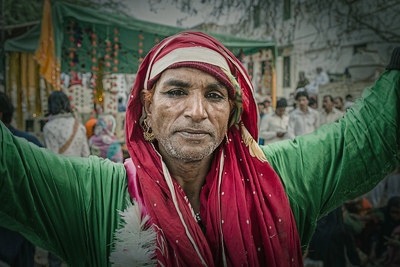

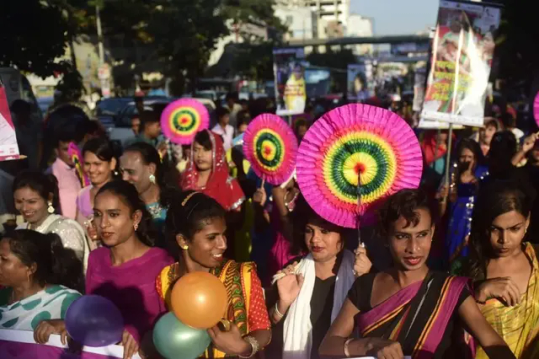
Traditionally, the hijra are known as individual of “separate gender” in South Asian society. Most hijras are born as male and very few are born as intersex. Most Hijras present themselves in feminine attire, while other may present themselves in masculine or androgynous attire. The hijra use feminine name & pronoun for themselves. While other may use masculine & gender-neutral name & pronoun. The hijra are officially recognized as ''Third gender'' in Bangladesh, Pakistan, India & Nepal.

The word “Hijra” came from the Arabic word Hijr. While others argue that the word came from the Farsi word Hīj. In Arabic, Hijra literally means migration, leaving own tribe/clan. In broadest definition it means spiritual transformation, transcending boundaries. Despite having a sacred meaning, the word hijra has become a slurr in most parts of South Asia.
In India, many transgender folks like to avoid hijra for themselves. Instead they prefer Kinnar/Kinner, Shiv-shakti, Aravani, Mangala-mukhi, Moonaam Lingam, Kothi, Thritiya Linga, Tirunangais, Thirunangai, Tirunaṅkai, Thirunambi, Khwaja sira, Trans man, Trans Woman, Non-binary, Brihannala, Shikandi, etc for themselves. In Pakistan, hijra term is mostly used in a derogatory manner. This is why, non-hijra transgender & hijra transgender folks preferred Khawaja sara/Khwajasira, Mukhannath, Mutajannas, Moorat for themselves.
History
The existence of hijras or eunuchs first documented in the royal harems of Delhi Sultanate.In the 7th century, Hijras became trusted servants in the Mughal courts. (Please note:The term eunuch in reference to hijras or transgender in southeast asia is now considered pejorative; however, historical research finds the terms eunuch and hijra used interchangeably).

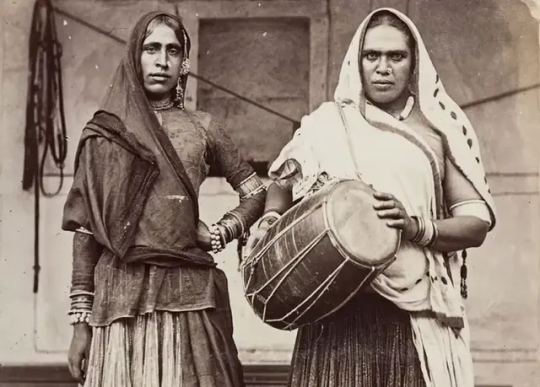
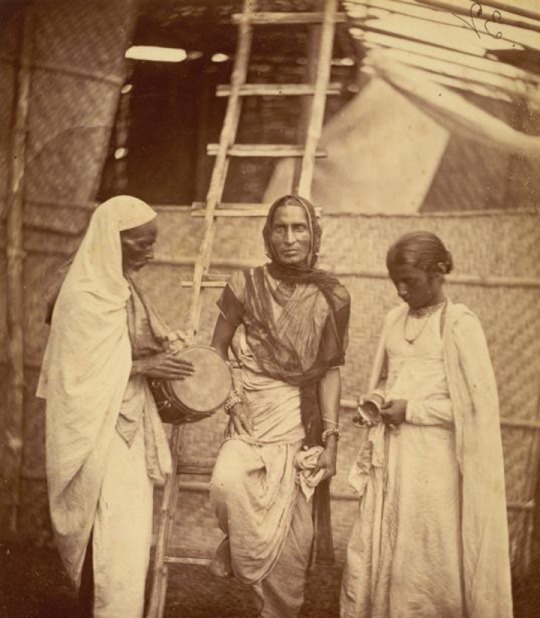
In those days, Hijras or transgenders were allowed to travel freely between men’s quarter and women's quarter, administrate the royal harem, & take care of the harem's children. Different travelogues documented that Hijras were also “intimate servants” and “beloved” of kings, princes, queens & princesses. During the mughal era, Hijra community played important roles in royal court,in royal households,in diplomatic and military affairs.
During the colonialism:
Mass Persecution of hijras/gender variants & gays in Indian subcontinent started during the British colonialism. In early 1850s, British colonial authorities deployed various strategies to eradicate India's gender & sexual minorities, whom they saw as "a breach of public decency." Further Britishers viewed hijras as incapable of moral transformation & assimilation. Therefore, they were subjected to eliminatory policies. In 1860, hijras became subjected to anti-sodomy law Section 377 which allowed British authorities to prosecute hijras (for their existence).
In 1861, authorities of the North-Western Provinces (NWP) sought to enact a 'Special law' against hijras/gender variants. By 1870, no high-ranking British officials argued against the implementation of special legislation to address the 'hijra problem; thus solidifying a violent anti-hijra campaign all across the Indian subcontinent. Anti-hijra laws were enacted; whereas a law outlawing castration, a central part of the hijra community (although not required for community membership), crossdressing, community gathering, ritual practices. The hijra were included in the Criminal Tribes Act of 1871 and labelled a "criminal tribe", now subjected to compulsory registration,strict monitoring, and stigmatization. Because of economic costs, which were the main impetus behind British colonialism, Hijras and other so-called "criminal tribes" were unable to be collectively sequestered from colonial society. This act forced the hijra community to go underground. British authorities considered “eunuchs” responsible for sodomy, kidnapping, and castrating male children (Hinchy 2019). Although the Criminal Tribe Act was rescinded in 1952, a collective memory still paints hijras as historical gender deviants with a criminalized sexual variance. After independence, hijras survived these barbaric colonial extermination attempts.However, the centuries-old stigma & shame continues as transphobic legacy in Southeast Asia.
Culture & Lifestyle
Transgender, MTF transvestite, effeminate/kothi, non-binary, and intersex individuals who live in Hijra community must undergo an initiation rite. Through this initiation rite, one can be a part of hijra community. Many hijras practice castration & emasculation, for attaining a high level of spirituality & sacredness. Not all hijras do castration.
The hijra gharanas are symbolic units of lineage, called a house, guiding the overall schematic outlining of the social organization of the hijra community in Indian Subcontinent. Hijras community follow a guru-chela kinship system, in which guru leads her chelas, provide them money, foods,shelter & other resources. This kinship originally developed on the basis of sufi discipleship of Pir-Mureed. In hijra community guru called their chelas daughters or son & chelas called their guru mother. Guru's guru are called nani guru (sometimes grandma). Nani gurus has the highest rank within hijra community.
They usually earn their money by collecting donations, ritual blessings (badhai), begging in streets, singing & dancing in social occasions, sex work. Collecting donations or alms, ritual blessing, sex work are common sources for their income. But now they are quitting such professions & doing various works for living.
12 notes
·
View notes
Text
4 notes
·
View notes
Photo
that word, (H*jra) is often used in a derogatory way, please don't say it so loosely.
Much more respectful terms are "Kinnar" and "Khawajasira"
Kinnar is the name for gnc celestial court dancers along with the traditionally female apsaras and male gandharvas. And in north India at least its what the community prefers to go by.
The origins of Khwaja sira are more murky but its been linked to sufism and somewhat emphasizes the "mismatch between their visible bodies (hazir) and the invisible soul (ruh)"




Hijras of Pakistan, Bruno Morandi
Hijras, who can be eunuchs, intersex or transgender, have been part of South Asia’s culture for thousands of years. Eunuchs are celebrated in sacred Hindu texts such as the Mahabharata and the Kama Sutra. They also enjoyed influential positions in the Mughal courts. (x)
48K notes
·
View notes
Photo

How Pakistan’s Khwaja Sira and transgender communities are fearing and fighting for their futures Content warning: mentions of violence, transphobia. Khwaja Sira activist and community leader Shahzadi Rai is frustrated. It’s midnight on 1 February, and she’s just spent her evening fighting for the survival of Scrap Fest – a music festival highlighting trans and underground performers in Karachi, Pakistan. It was originally scheduled for that upcoming weekend, but […] The post How Pakistan’s Khwaja Sira and transgender communities are fearing and fighting for their futures appeared first on gal-dem. https://gal-dem.com/pakistan-khwaja-sira-transgender-activism/
0 notes
Text
A set of parents get their child’s gender changed, smashing one stereotype at a time
A set of parents get their child’s gender changed, smashing one stereotype at a time
As a country, our attitude towards the transgender community has only recently become civil. People are now ditching offensive terms like “khusra” or “chakka”that are derogatory and referring to the community as “Khwaja-sira” and viewing them as their respective counterparts. However, much of the stigma around being “transgender” is ever-present. If parents learn that their child is confused…
View On WordPress
0 notes
Text
New world news from Time: Out of the Shadows: Pakistan’s Transgender Candidates Step Onto the Political Stage
Each week, residents of Islamabad call in to Nadeem Kashish’s radio show to vent frustration with the problems bedeviling Pakistan’s capital: a lack of running water; chronic electrical outages; soaring rent prices. On air, Kashish’s voice crackles with energy, imploring listeners to vote and hold politicians accountable on their campaign promises. But the program has been flooded in recent weeks by a new kind of call: Well-wishers ring in to congratulate the 35-year-old transgender woman on her bid to take the political reins of the capital — a coveted constituency where she will face off against several political heavyweights.
“I am running against big names like Imran Khan and former Prime Minister Shahid Abbasi, and I’m not considered a real threat,” Kashish, who is running as an independent in Pakistan’s nationwide elections on Wednesday, tells TIME. When she’s canvassing voters door-to-door, some jeer and poke fun at her appearance; she has close-cropped hair, sometimes wears lipstick, and does not conform to gender binarism. “People hear about my election run and think it’s a joke, they just start to laugh,” Kashish says, imitating her critics with a high-pitched chuckle.
Kashish, whose family disowned her at a young age, is an unconventional politician. She lives in a group home of transgender people in one of Islamabad’s grittiest slums, Mohallah Noori Bagh, Bari Imam. Kashish is one of a handful of transgender candidates stepping up to run for public office. The Muslim-majority country of 207 million gave transgender citizens the right to vote in 2011, and this week will see three transgender candidates running for seats in the National Assembly, as well as two others for seats in provincial legislatures.
Read more:Cricket Hero Imran Khan Led Pakistan’s Team to Victory. As a Politician, He’s Riding a Populist Wave
Advocates estimate that Pakistan’s transgender community numbers half a million, though official census figures count them at 10,000. South Asian society has traditionally viewed the hijras or khwaja siras, as they are sometimes known locally, with a mixture of veneration and suspicion; believed to have mystical powers, many people fear their curses but invite them to bless childbirth and marriage ceremonies. During colonial rule, the British enacted the Criminal Tribes Act in 1871, which branded hijras and other social minorities as threats to public order and morality. Members of the marginalized group have historically been relegated to begging — even today, it is not uncommon to see trans men and women panhandling at stoplights in major cities.
Asif Hassan—AFP/Getty ImagesA Pakistani transgender activist poses for a photograph as they take part in a demonstration in Karachi on Nov. 20, 2017.
The transgender community has made tremendous strides in terms of legal rights in post-Independence Pakistan, though they still face discrimination, harrassment and societal exclusion. A 2009 Supreme Court verdict officially recognized the rights of those identifying as third gender, and in May, the National Assembly passed a landmark Transgender Persons (Protection of Rights) Act enshrining basic rights and outlawing harassment and discrimination. But a string of killings just this year underscored the violence and discrimination still faced by the trans community. This month, a transgender citizen was shot dead at a wedding in the eastern province of Punjab, while in March another was murdered by motorcyclists in an apparent hate crime in the frontier city of Peshawar. The TransAction Alliance, a Pakistani trans-rights organization, has reported more than 50 such deaths in the last three years.
“Until you can influence the laws, you are their slaves — you are following rules and laws set by someone else,” says Nayyab Ali, a 26-year-old transgender candidate running in her hometown Okara, a city in Punjab, the country’s most populous province. Running on the Pakistan Tehreek-e-Insaf Gulalai party ticket, Ali is one of the few transgender candidates representing a political party; most have shied away from trans candidates, viewing them as novelty runs that attract attention but yield few votes. Ali, who was attacked with acid by a previous boyfriend, is hopeful that she can advance transgender, minority and human rights. “We are not just the voice of the transgender community, we are also the voice of women and minorities,” she says. “If you want a real change, vote transgender.”
Read more: Ahead of Pakistan’s Elections, Transgender Activists Push for a Seat at the Table
Activists say there are still barriers even getting the community to the polling stations, despite at least 25 transgender people serving as election observers. Separate male and female polling stations lead some to fear harassment if they are seen to be entering the “wrong” station. Others stay away because they lack identity cards listing them as being transgender, despite recent electoral reforms promising expedited documents. Moreover, many transgender people are registered to vote in home districts from which they have been ostracized.
“This is everyone’s story,” says Kashish, whose own family banished her from their home in Multan, seven hours away by road from Islamabad. But while she may not be welcome in her own home, Kashish has found a place in the lives of her listeners — even if elections don’t end in her favor. “My voice has traveled far, it’s reaching the whole world,” she says. “This is my victory; if you go in front of people and show your character, they will accept you.”
July 23, 2018 at 02:40PM ClusterAssets Inc., https://ClusterAssets.wordpress.com
0 notes
Text
New world news from Time: Ahead of Pakistan’s Elections, Transgender Activists Push for a Seat at the Table
Pakistan’s transgender community recently celebrated the passage of a landmark law recognizing their basic rights. The Transgender Persons (Protection of Rights) Bill 2017 allowed citizens to determine their own gender identity, as well as banning harassment and discrimination against transgender people by employers, education services, and healthcare providers.
Pakistan became one of a handful of nations that provide protections for the minority, known locally in the country as khwaja siras — an umbrella term for members of the “third sex” community.
Historically, transgender people have occupied a complicated position in South Asian societies across Bangladesh, India, and Pakistan. They are sometimes revered for supposed mystical powers, or invited to dance at auspicious events like weddings and births to bless the parties. Others see khwaja siras as misfits, relegating them to begging and prostitution to make a living. In Pakistan, attitudes toward transgender people can turn deadly. Earlier this year, a transgender woman was shot dead because she didn’t have change to break a higher currency note. In 2016, a community activist died of gunshot wounds because the hospital couldn’t decide which ward, male or female, to admit her to.
“Transgender people have been recognized in South Asia for centuries — the gender binary idea came into the picture only when the colonizers arrived,” says Omar Waraich, deputy director of Amnesty International in South Asia. “Sadly, they are ostracized and treated as freakshows by large sections of society.”
The new law is the latest step in a series of slow but significant developments that have helped Pakistan’s khwaja siras gain recognition. The community was first legally recognized in 2009 in a Supreme Court ruling that stated transgender people could obtain national identity cards with a third sex option. In 2013, Bindiya Rana, became one of the first legally recognized transgender women to stand in elections, and last year saw the country’s first third-gender passport being issued. In March, journalist Marvia Malik became Pakistan’s first transgender news anchor.
In the run up to Pakistan’s general elections on July 25, the law has taken on a new significance. About 13 transgender people were initially contesting seats this year. But nine candidates have reportedly dropped out due to financial constraints and public harassment to withdraw their nominations, underscoring the obstacles transgender people continue to face.
“For me, the real historic moment will be when a transgender candidate wins a seat,” Waraich says. “No one can say whether that will happen in these elections but you do get a sense that there is a sense of wanting to try something different.”
Ahead of the polls, TIME spoke to transgender activists who are spurred by a desire to help Pakistan’s transgender community have a voice in the national dialogue.
Bindiya Rana, chairperson, Gender Interactive Alliance Pakistan
Insiya Syed—ReutersBindiya Rana, a transgender independent candidate for the elections, during a pre-election analysis program in Karachi April 23, 2013.
“I was one of the first legally recognized members of my community to stand for elections in the 2013 polls. I ran because I wanted to show people that transgenders are just as capable as others and to inspire others like me. Despite the new law, there is no mention of khwaja siras in party manifestos and no reservation for us in government bodies.
The last national census listed just over 10,000 transgenders in all of Pakistan but the actual number is much higher. It felt like they don’t consider us as citizens. And it’s because of that census report that we couldn’t get the 5% reservations that we asked for in the bill. That’s why our community has to fight these elections for a seat at the table.”
Nayyab Ali, candidate in 2018 elections and national spokesperson, All Pakistan Transgender Election Network
Courtesy of Nayyab Ali.Nayyab Ali campaigning ahead of Pakistan’s upcoming general elections.
“The transgender community is progressing slowly in Pakistan — we’re finding positions in various industries like education and journalism. But the real change-making power lies in politics, which is why I’m contesting the elections this year. We need to be part of the legislative process to better our community. It’s nice to talk about acceptance and social inclusion but the ground realities need to change, too.
The new bill is encouraging though there’s still a lot of work to be done. Committees will be set up, policies drafted, by-laws framed and we need to be part of that. We now have something to work toward though there’s a long way to go. But I’m positive, there has been a lot of support and goodwill so far.”
Mehlab Jameel, activist, involved in the drafting process of the new law
“I realized the importance of having a voice in the legislative process while drafting the new bill. One of the earliest versions had a clause that allowed for a screening committee to administer medical tests and decide who was and wasn’t a transgender. That went completely against our rights — we need to be recognized on our own terms.
That’s why when we had a chance to sit down with parliamentarians and the National Commission for Human Rights, the body that was tasked with drafting a new bill, we pushed for self-perceived gender identification. They were very understanding and heard us out and finally gave into our demand. But without that dialogue this wouldn’t have happened.
The transgender community is active now and the momentum is with us. We have to build on it during the elections.”
July 19, 2018 at 11:06AM ClusterAssets Inc., https://ClusterAssets.wordpress.com
0 notes